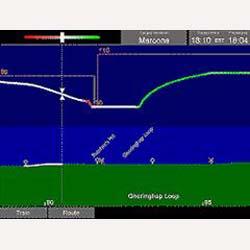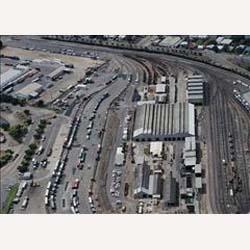CQU-based centre reduces major cost for long-haul rail freight
Published on 21 November, 2006
The CQU-based RAIL Cooperative Research Centre’s (CRC) FreightMiser project is on track to shave 10 per cent off long haul freight fuel bills, thereby significantly reducing greenhouse gas emissions.
FreightMiser software, developed at the University of South Australia in conjunction with TMG Rail Technology as a project of Rail CRC, is an in-cab advice system for train drivers. The system advises the ideal acceleration and deceleration profiles to reduce fuel consumption and ensure trains run to time.
 TMG International Senior Consultant and FreightMiser project manager Robert Yee said the system had the potential to save millions of dollars in fuel costs and consequent greenhouse gas emissions.
TMG International Senior Consultant and FreightMiser project manager Robert Yee said the system had the potential to save millions of dollars in fuel costs and consequent greenhouse gas emissions.
“For long-haul rail freight transport, fuel is one of the largest operating costs,” Mr Yee said.
“FreightMiser can significantly reduce this – saving 10% of the total fuel bill, and that will also mean a commensurate reduction in greenhouse gas emissions. That is a significant saving for Australia’s long-haul freight train operators.
“It (FreightMiser) has a big future Australia-wide and internationally.
“There are other systems on the international market, but FreightMiser works on different principles and is simpler in both its hardware and software – this means it’s easier and cheaper to install and offers a quicker return on investment\".
FreightMiser technology is currently being commercialised by Rail CRC partners TMG Rail Technology, Pacific National and the University of South Australia, and should become operational in NSW early next year.
The project is one of approximately 40 Rail CRC research projects, which were established and supported under the Australian Government’s Cooperative Research Centres Program.
Measured Impact of Train Speed Restrictions.
MEANWHILE, rail operators now have a simple and valuable tool to calculate the impact of speed restrictions on scheduling and energy consumption thanks to an innovative Rail CRC research project led by the University of South Australia (UniSA) and the Australian Rail Track Corporation (ARTC).
ARTC engineer and Project Manager Matthew Reedman said the new technology offered a far simpler tool to measure the impact of speed restrictions than any other currently available.
 “The commercially available alternatives are fairly detailed. They are too slow to run, and require too much information to input,” Mr Reedman said.
“The commercially available alternatives are fairly detailed. They are too slow to run, and require too much information to input,” Mr Reedman said.
“The technology we’ve developed is very simple to operate and input\".
“For ARTC, it is an effective tool to help us prioritise and manage the impact projected speed restrictions may have on timetabling – managing that well is the number one KPI operators are interested in\".
Mr Reedman said the technology was ready for commercial use and would be operational next year.
Rail CRC is based at Central Queensland University’s Rockhampton campus and consists of rail industry partners – ARTC, Queensland Rail, TMG Rail Technology, Pacific National, and Rail Corp - and six university partners – The University of South Australia, The University of Wollongong, Central Queensland University, Monash University, Queensland University of Technology and The University of Queensland.
For more information on this or other Rail CRC projects visit www.railcrc.com.au .
Images courtesy Rail CRC.

